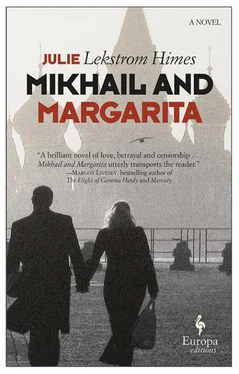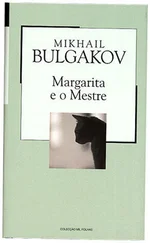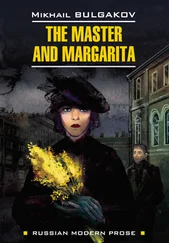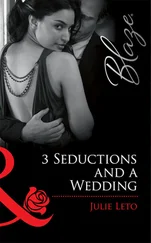He’d thought nothing of Likovoyev’s flirtations with his wife. Nothing whatsoever, except some faint gratitude that the critic provided something which Bulgakov lacked all interest in supplying. That Likovoyev’s stilted affectations might satisfy her in some small way. They, he and Tatiana, had laughed about him, yet perhaps, she had laughed not as much. He’d considered her secret satisfaction with the critic’s attentions a kind of naïveté that should not have been surprising. He wasn’t surprised and hadn’t begrudged her those small pleasures.
There was no crime, no clandestine tryst that had come between them. Nothing save the briefest reluctance, the sparest of pauses, one afternoon as he’d stuttered through his regular tirade about him. For the first time she had not immediately agreed. For the first time she’d been quiet. And in that silence he saw her consideration for the critic, her alliance with him, and realized that this Likovoyev, though incapable of comprehending even the most lucid of writing, could nonetheless reveal in his boorish maneuverings a desolation in her far greater than some naïveté. Bulgakov turned to her for some explanation. She pressed her lips together and looked away as if something had passed their window.
Afterwards, he told himself she did not matter so much; it’d been a mistake from the start and it was easier to let her go. She did not leave right away, but drifted further and further, until one day her belongings slipped away as well. He came home that afternoon to those empty spaces. He left them that way for days, hangers in the wardrobe, the place by the door where her shoes had stood. He found reasons not to fill them; he told himself, though, it was not because she might return. It was not because her things might again need a place to stay.
He found his glass and tipped it forward to pool the remaining drops. He lacked the power to maneuver the world in his favor; he could not even will the waiter to sedate him with more drink. He started to lift it but found his hand restrained.
“Talk to Stanislawski,” said Mandelstam. He nodded as if he understood the problem.
Bulgakov considered his glass. “I will,” he said. Osip relaxed his hand and Bulgakov tipped back the last drops.
The musicians had begun to play again; they took up a jazz line. Music filled the spaces between conversations. Mandelstam frowned as if he’d been interrupted. Then he looked upward. Someone was by their table.
“Good evening, my dear,” he said. He sounded slightly annoyed.
The pale gown from before was beside them. It was Margarita Nikoveyeva.
Bulgakov had seen her before, though not with the poet. They’d tried to conceal their affair although many, even Mandelstam’s wife, it was said, knew of it. There had been the time, the previous fall, at a party in this very room. He’d watched as she’d put off the advances of another man. At one point she’d looked about as though for some means of escape, and caught his gaze. Bulgakov had smiled, both sympathetic and duplicitous, and across that space they had shared an understanding. Or so he’d thought.
Tonight she was different, though. Indeed, all of her seemed unreasonably pale. Her hair pulled back in a chignon was silvery in the dim light; her ivory-colored dress, unadorned, fell in simple lines. He became aware of her breathing from its gentle motion. Her fingers rested on the edge of the tablecloth, as if to steady herself. Behind her, the band seemed muted. She nodded to both men but addressed only Mandelstam. Bulgakov expected him to compliment her appearance; the light of the room seemed to soak into her. But it wasn’t this that gave her an unworldly appearance. She had the air of the ill-fated; of one about to step from a platform onto empty tracks, the sound of a train filling the air. Not with the purpose to end her life so much as to embrace the monstrosity. He wanted to pull her to safety and at the same time to stand back and watch her proceed. He stood to give her his chair; she smiled a little, shook her head, and returned her attention to Mandelstam. He had remained seated.
When Mandelstam spoke his voice had taken an edge.
“Who are you with tonight?” He spoke as a brother might, or a father. Someone responsible for her in some way. Or as an ex-lover. Reminding her that without a Union membership, she could not have gained entrance on her own merit. But perhaps more meaningfully, he was demonstrating his right to ask that question in that manner.
An embarrassed smile fluttered across her face; she provided a name. Bulgakov didn’t recognize it, but Mandelstam nodded.
“You look well,” she said. She sounded mildly hopeful in this.
“Perhaps in this lighting I do.”
She continued with less certainty. “And Nadya?”
“She actually is quite well. But I don’t think I’ll tell her you asked.”
He was condescending to the point of contempt, Bulgakov thought. He reached for Mandelstam’s arm. She’d come to them, after all. Was there a need for this? Mandelstam moved his arm away.
“I simply wanted to say ‘hello.’” She said this without apology or defense, as if a little tired.
“And so you have,” he said flatly.
“I mean there’s no reason for us to pretend we don’t know each other,” she said. She seemed not to lose courage, but hope.
Mandelstam frowned at the cloth and swept its crumbs aside as though he no longer had patience for them. They bounced lightly off the skirt of her gown.
“You are far too willing to overlook my shortcomings, my dear,” he said. He smoothed the now-clean cloth with his hand.
Only her eyes revealed her distress, her unwillingness to believe his animosity and yet her acceptance of it. Her vulnerability was breathtaking. He wondered if Mandelstam saw this as well.
“Perhaps,” she said quickly. “That would be my shortcoming.” She turned to Bulgakov. “Please enjoy your meal,” she said.
“We’ve finished,” said Bulgakov, correcting her. “It wasn’t particularly good.”
“Ah, well then, enjoy—” She left her sentiment unfinished, unable to come up with a better idea of what they were to delight in. She’d already turned. He watched her recede, feeling as though he’d allowed her to escape.
Mandelstam watched her as well, his expression very different from the one just moments before. There was an old affection, perhaps one that had been retired, yet nonetheless remembered, and it occurred to Bulgakov that she was the reason they’d dined here this evening. She disappeared through one of the veranda doors and Mandelstam’s gaze found his. “She should know better,” Mandelstam said.
“I think she does now.”
“I suspect not.”
The door’s opening maintained its velvety darkness. Bulgakov looked for her to reappear but it remained empty.
“We were speaking of your play,” Mandelstam said.
Bulgakov thought that perhaps he’d rather talk about Margarita.
Mandelstam and Bulgakov left the restaurant together. The streets were wet and empty; the sky was low. Bulgakov felt the hum of alcohol out to his fingertips. He felt connected to the dense warm air that rose from the glistening asphalt. He wondered where Margarita might be at that moment. He imagined her alone, perhaps on a street like this one, then remembered she was with someone else. Was she holding his hand; his arm? Had he provided her comfort? He wondered how he might see her again.
Two uniformed men stepped into the street. Mandelstam stopped then immediately moved away from Bulgakov, and the four men stood apart, the points of some ill-formed square. Bulgakov was for a moment confused.
The gold threads of the police insignia glimmered in the light of a nearby streetlamp.
Читать дальше












